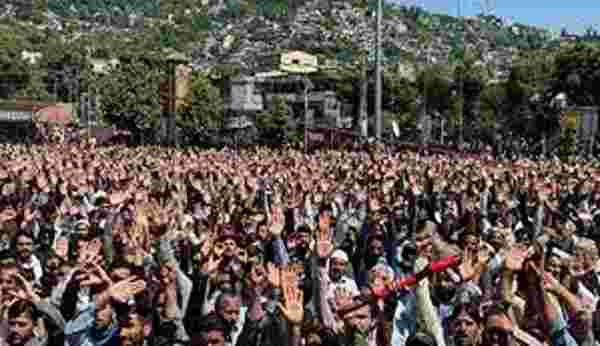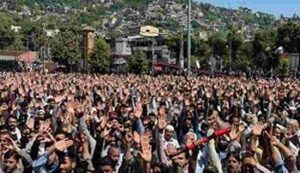
Pakistan protest: The world is aware that the biggest exporter and funder of terrorism is Pakistan. Pakistan is undergoing internal turmoil, and its citizens are likewise tired with its leaders. Thousands of people demonstrated against the Shahbaz Sharif administration in Pakistan-occupied Kashmir (PoK) on Monday, the biggest demonstration in the region’s history. The government deployed several security officers and blocked the internet in an attempt to quell these demonstrations.

Following a road blockage and closure announced by the Awami Action Committee (AAC), demonstrations broke out in Mirpur, Kotli, Rawalakot, Neelam Valley, Keran, and other districts. By using security personnel and blocking the internet since midnight, authorities tried to silence the people. An AAC leader attacked the government in a speech, stating, “They will listen to shoes, not words.”
popularity among locals by bringing up grievances about long-standing economic neglect and political marginalization. The committee’s main requests are outlined in a 38-point agenda.
“Our campaign is not against any institution, but for the fundamental rights that our people have been denied for more than 70 years,” AAC leader Shaukat Nawaz Mir said in Muzaffarabad. Enough is enough. Either grant us our rights or risk the wrath of the people.” In response to the demonstrations, the Pakistani government has sent out a large number of security personnel.
Over the weekend, police blocked entrance and departure points, hundreds of troops were summoned in from Punjab, and armed convoys marched with flags in key towns. Additionally, critical installations were subject to increased security. From the capital, another 1,000 police officers were sent.
“Peace is the collective responsibility of citizens and the administration,” the Dawn daily cited District Magistrate Mudassar Farooq as stating. Following the failure of protracted negotiations between federal ministers, the PoK administration, and AAC representatives, the move was taken. After the AAC refused to make concessions on the wealthy class’s special privileges and the elimination of refugee seats, the 13-hour-long negotiations came to an abrupt end. Declaring that the negotiations were insufficient and unsatisfactory, Shaukat Nawaz Mir pledged to go on with the demonstrations.
Anxiety and fear are rampant in PoK. To enable residents to restock on necessities, merchant organizations in Muzaffarabad kept their stores open on Sundays. Convoys of security troops were seen approaching the region in viral footage, which sparked concerns of a brutal response.
In a number of areas, slogans calling for an end to Pakistan’s “forcible occupation” found resonance. AAC leaders cautioned Islamabad that they would not back down from their fundamental demands, despite their assurances that the demonstrations would be nonviolent. Mir, however, said on Monday morning that the demonstrations would be temporarily canceled because of concerns about repression. The AAC said that on October 15, the movement’s second phase will start across PoK.
Pakistan’s strict grip over Pakistan-occupied Kashmir (PoK) has been further shown by the demonstrations. Islamabad has been accused by Shaukat Nawaz Mir and other leaders of the Awami Action Committee (AAC) of decades of corruption, negligence, and denial of fundamental rights including clean water, infrastructure, healthcare, and education.
Local legal groups have referred to the shutdown as a democratic right and backed the demonstrations. The government’s threats of using force might lead to further turmoil, civil society has warned. According to observers, Pakistan’s leadership is now being put to the ultimate test in this battle. Can it use dialogue to address the complaints of the populace, or run the danger of causing further political unrest in PoK?